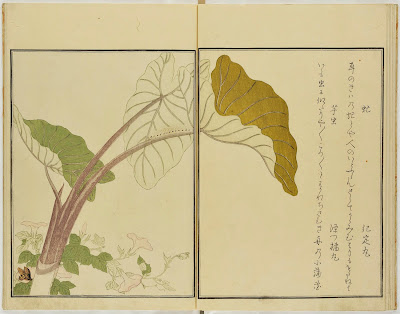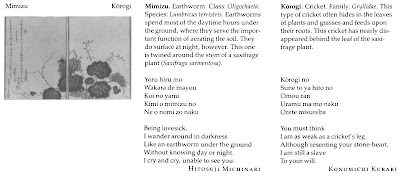The compiler Yadoya no Meshimori,
imitating the ‘Mushi no uta-awase’ (Poem Competition of Insects) of Kinoshita
Choshoshi, has arranged a ‘kyoka’ competition between thirty ‘kyoka’ poets
of the day on the topic of insects—in addition all are "comic poems on the
feelings of love" (koi no kokoro no zare-uta).
Almost all the prominent members of the
Temmei era ‘kyoka’ fraternity are represented, but rather than being led by
Meshimori, it is more likely that the whole project was proposed and carried
out from start to finish by the publisher Tsutaya Juzaburo, himself taking the
central role. It goes without saying that Utamaro's designs are superb, but the
achievements of the engravers and printer also deserve particular admiration.
As mentioned in Toriyama Sekien's
postscript, the carver was Fuji Kazumune, a famous craftsman whose name also
appears on the ‘oban’ colour woodblock triptych by Shumman "Inside and
outside the fence" (Hei no naigai). The book seems to have been favourably
received from the start, as is evidenced by the various later printings and
variant editions, but discussion of these is reserved for another occasion. The
British Museum copy formerly in the collection of Jack Hillier is an early
printing of the first edition.
https://www.britishmuseum.org/collection/object/A_1979-0305-0-152-1
https://www.britishmuseum.org/collection/object/A_1979-0305-0-152-2
https://en.wikipedia.org/wiki/Utamaro
Volume One, Number 1 picture
As a late intervention, I'm adding chunks of the text from a lovely book ...
SONGS OF THE GARDEN published by the Metropolitan Museum of Art in 1984
text and translations by
YASUKO BETCHAKU and JOAN B. MIRVISS
Volume One, Number 2 picture
Volume One, Number 3 picture
Volume One, Number 4 picture
Volume One, Number 5 picture
i had thought this next page was a low grade black and white photograph, but closer study shows it to be Utamaro's rendering of insects that glow in the dark
Volume One, Number 6 picture
Volume One, Number 7 picture
Volume One, Number 8 picture
Volume Two, Number 1 picture
Volume Two, Number 2 picture
Volume Two, Number 3 picture
Volume Two, Number 4 picture
Volume Two, Number 5 picture

Volume Two, Number 6 picture
Volume 2, Number 7 picture
There is an introduction by ? Utamaro's teacher
To capture life in one's heart and mind and to draw its forms with the brush is the true art of painting. To capture the life of insects as my pupil Utamaro has done here; this is painting from the heart. In the days when Mr. Uta was little, wasn't he always interested in the details of everything. As a game he would tie a string to a dragonfly, or put grasshoppers and crickets on the palm of his hand and become totally absorbed - so much so that I often had to warn him, fearful that in his passion for these living things [he might crush them]. But now his artistic scheme [in this book] has truly burnished the virtue of all his skill. Stealing the iridescence of the jewel beetle he has put old painting to shame. Rashly borrowing the sickle-like claws of the mantis to burrow deep with the worms, he has prevented its resurgence using pictures crawling with mosquito larvae, just like a watchman wielding his stick. For beginners [lost] in darkness he lights the way [of painting] with the glow of fireflies. Ordered to find a way to untangle the threads of the spider's web, and relying on the competing poems of various masters - while the engraver Fuji Kazumune has set to work on the cherry-wood [block] with his knife - I have acceded to the request to fathom its origins.
Inscription translation: Text by Toriyama Sekien Winter, 1787
There is a preface describing a summer night in the fields outside Edo in the company of a bunch of young poets
"On this, the night of the fourteenth of the eighth month, the usual group of comic poets dragged one another along to listen to the voices of the insects that chirp in the fields.
North from Ryogoku and east of Yoshiwara, we spread out our rugs on the embankment of the Sumida River near Iosaki, where they sell carp [and love], and tried to fix a value on the voice of each insect, high or low.
By force of circumstance we forwent wine and women, and so any females in the parties nearby must have said that we were a group of stingy worms. Intoned prayers from a nearby temple mingled faintly with the sounds of the insects, reminding us sadly of that worship hall for the princess built by Kuenshi.
We thought that it would be simply
inexcusable for people to accuse us of selling old leftovers at the morning
market and so, hot on the heels of the 'Poetry Contest on Various Insects'
compiled by [Kinoshita] Choshoshi, we have composed playful poems on the
sentiments of love.
??? Written by Yadoya no Meshimori shirusu.
looking for clues about the kyoka poems ? ...
https://endless-swarm.com/?p=795
last minute discovery ... The Met published SONGS OF THE GARDEN, a lovely book, back in 1984, now out-of-print ... containing the pictures AND THE TRANSLATIONS ... it is free to download in PDF format via this link
https://www.metmuseum.org/art/metpublications/Utamaro_Songs_of_the_Garden





























